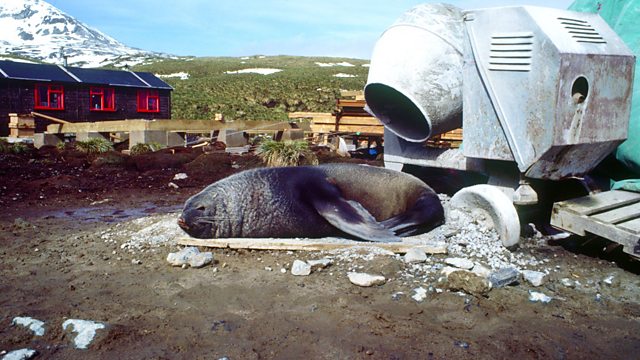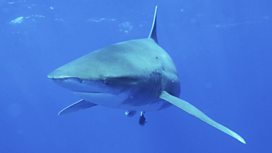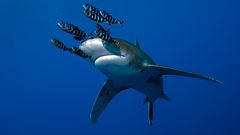Sharks
Sharks are one of the great icons of wildlife and the oceanic wilderness and yet are in severe decline across the world. How can people and sharks share the oceans?
Sharks are in decline across the world's oceans. It can be argued sharks have an image problem with reports of attacks on swimmers and surfers. Persecution and deliberate killing to clear areas near swimming beaches are only a contributor to shark decline. Legal fishing, by-catch, catching sharks for their fins are large contributors to shark decline. In this programme Monty Don talks to a wildlife cameraman who has filmed sharks for 20 years and recorded his observations of shark decline in his dive logs. In the Shared Planet studio we have Kelvin Boot and invited guests to talk about the ways in which the experts believe we can share the oceans with the large diverse group of fish. And a report from Fiji where a single living shark is allegedly worth $50,000 a year in dive tourist revenue.
Last on
![]()
In Living Memory: Jaws
Chris Ledgard explores the cinematic and zoological legacy of the Spielberg classic, Jaws
![]()
Sharks Attacked
Miranda Krestovnikoff goes in search of the UK's most enigmatic sea creature: the shark.
Colin Simpfendorfer

Professor Colin Simpfendorfer is the Director of the Centre for Sustainable Tropical Fisheries and Aquaculture. He has more than 25 years of experience in researching sharks, and has published extensively in the scientific literature on shark biology, ecology, fisheries and conservation. His expertise on sharks has been recognized by his appointment as the Co-Chair of the IUCN’s Shark Specialist Group and as the Chair of the Australian Fisheries Management Authority’s Shark Resource Assessment Group.
Colin is a graduate of James Cook University, having undertaken both his undergraduate and postgraduate training in Townsville. After completing his PhD he worked on shark fisheries at the Western Australian Fisheries Department before moving to Florida to work at the Centre for Shark Research at Mote Marine Laboratory. He returned to JCU in 2007 to lead the Fishing and Fisheries Research Centre, where he has helped build a research group focused on improving our understanding of sharks and how best to conserve and manage their populations.
��
In the picture Colin is taking a small sample of tissue from the fin of a grey reef shark.
Shelley Clarke

Shelley Clarke holds doctoral and masters degrees in quantitative fisheries science from Imperial College London and the University of Washington.�� Based in China and Japan for nearly twenty years, her research aims to promote a greater understanding of East Asia’s marine resource usage and influence.��
��
She specializes in shark fisheries management - particularly the shark fin trade, illegal fishing and seafood traceability - in her work for the United Nations Food and Agriculture Organization; the US, New Zealand and UK governments; the World Bank; and the Western and Central Pacific Fisheries Commission.
Michael Pitts

Michael Pitts has over 20 years’ experience of making wildlife and science documentaries for the ����ý and Independent Companies.�� Michael specializes in filming underwater and is regarded as one of Britain's foremost underwater cameramen. However, he is equally happy shooting on the surface or from the air.
��
Amongst his many awards he has received Emmys for cinematography on two ����ý landmark series: David Attenborough's 'Private Life of Plants' and 'Blue Planet'. He has just completed the underwater filming on Sky Atlantic's major 3D series on the Galapagos, presented by Sir David Attenborough. He is currently working on a 'Future Planet' Productions film on plastics in the world's oceans which is due for cinema release in 2013.
Broadcasts
- Tue 8 Oct 2013 11:00����ý Radio 4
- Mon 14 Oct 2013 21:00����ý Radio 4
Featured in...
![]()
Sharks
Brace yourself for our collection of shark related tales.
Learn about habitats with The Open University
Explore the twists and connections of natural life in four different UK habitats.





